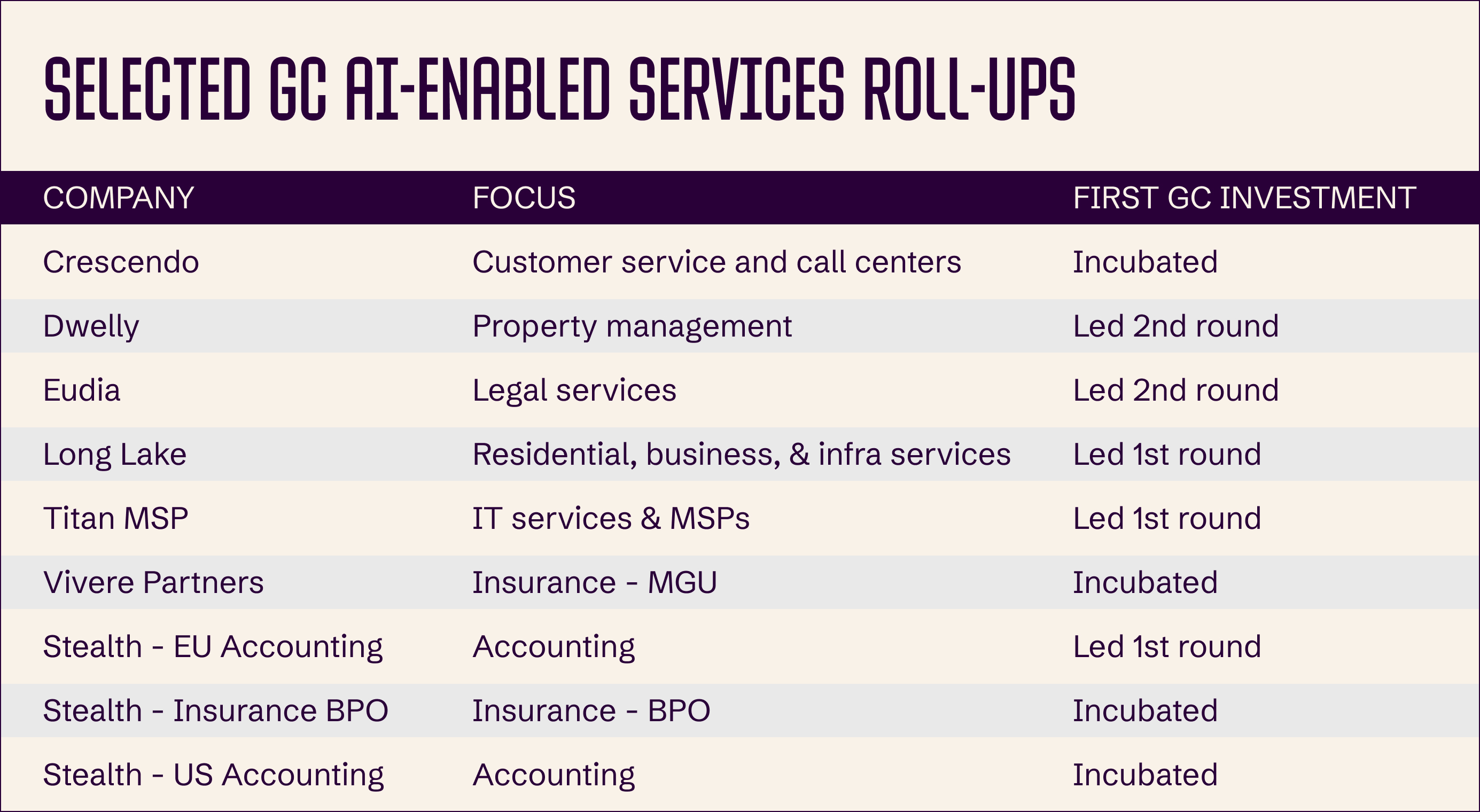Table of contents
Customers care about outcomes, not products. The SaaS gold rush made that easy to forget: think of all the product managers, product marketing, product launches, product-led growth. Anything that could not be “productized” remained the domain of VC-taboo, low-margin services businesses. But services businesses deliver outcomes, too, on a much bigger scale than software products.
For more than three years, we have pioneered and deployed a new model for services transformation that pairs applied AI with strategic acquisitions of service businesses. We call this the AI-enabled roll-up.
The companies we partner with run entire service businesses so much better that they can set radically new standards for the scope, speed, and thoroughness of the outcomes that their customers expect. These companies can match or even exceed the SaaS-era’s Rule of 40 for combined profitability and growth. We believe applying the AI-enabled roll-up model’s advantages at the scale of the services sector can generate a boom that eclipses the SaaS wave of the past decade and a half. Software only set the table for the future of services.
Capability-Led Growth, Compounding through Direct Ownership
Service industries, like Information Services, Professional, Scientific, and Technical Services, and Administrative and Support Services, generate $6T+ annually in the U.S., substantially exceeding the entire $370B software market, yet remain largely untouched by meaningful AI integration. Until now, technology solutions for services businesses were limited to SaaS products that charged license fees per user. These tools helped workers do their jobs but didn't fundamentally change the work. AI-enabled roll-ups transform services business models first by expanding the outcomes they offer customers (a capability-led growth that expands market size organically) and then by compounding and scaling via strategic acquisitions.
Capability-Led Growth
AI transforms what service businesses can accomplish. SaaS tools helped accountants process tax forms; AI processes the forms so that accountants can provide enterprise-caliber financial modeling and advisory work to every small business client on its books while simultaneously growing their client roster. Where legal software previously helped lawyers draft standard contracts, AI can enable them to negotiate complex multi-jurisdictional deals in regulatory environments they've never encountered before, customized for clients that would never have been able to afford Big Law fees.
Entirely new markets can emerge when services that were once exclusive to enterprise budgets become accessible to Main Street businesses. Companies with $5-10B in revenue spend $30-80M annually on legal services, while America's ~35M small businesses spend on average just $13,300 each. But when AI enables sophisticated legal analysis at accessible rates, every small business becomes a potential client for services they never knew they could access.
Compounding Through Direct Ownership and Acquisitions
Distributing this expanded range of outcomes requires more than selling licenses for tools. Our years of experience pioneering the AI-enabled roll-up model have shown that technology builders capture even more value by directly owning and operating the service businesses that deliver these transformative capabilities to end customers.
To do this, we back founders who develop AI solutions for specific services industries, then we provide capital and expertise to acquire and operate businesses in that sector. Unlike traditional leveraged buyouts that rely on financial engineering, this approach integrates purpose-built AI to develop and grow topline revenue through entirely new operational capabilities while adding to the platform via acquisitions.
A New Benchmark for Growth and Profitability
The SaaS industry's Rule of 40 reflects the inevitable tradeoff between growth and profitability. We believe AI-enabled roll-ups can eliminate this tradeoff, achieving higher combined growth and profitability through efficiency gains that yield software-level margins, immediate inorganic growth from acquisitions, and expanded outcome capabilities that create new markets. The companies we back aim to take businesses growing in single digits to 10-20% growth through a combination of organic capability-led growth and acquisitions. They simultaneously aim to double profit margins, often targeting 30-40% margins. They are setting their sights on a new Rule of 60 standard.
Proof From Our Portfolio
We have been committed to building AI-enabled roll-ups with first-mover founders for years, and results are already visible across many companies where we’ve introduced this approach.

Eudia is building the next-generation infrastructure for legal work. The $1.05T legal industry directs most of its spend to legacy law firms that still equate time with value, an approach that has historically left in-house teams overburdened and underserved. These teams have long sought more efficient alternatives but lacked the mechanism to meaningfully reduce reliance on external counsel. With recent advances in AI, that inflection point has arrived: the majority of legal work (including contract analysis, compliance, and M&A due diligence) can now be automated. Eudia is leading this transformation with a vertically integrated, AI-native platform that pairs proprietary technology with a 300+ person legal delivery team, acquired through the purchase of Johnson Hana in July. This structure enables Eudia to move beyond point solutions and deliver complete legal outcomes as a subscription-based service, unlocking scale and speed while driving down reliance on traditional law firms. In addition to the private sector, Eudia is also working with governments, where hundreds of thousands of people still review legal documents manually, offering an exciting opportunity to modernize public-sector legal infrastructure. By combining AI and human expertise into a single, unified offering, Eudia captures the full value chain of legal services while building a scalable blueprint of applying AI to other back-office functions beyond legal.
Titan MSP is transforming IT services. Most businesses outsource IT support to Managed Service Providers (MSPs), whose technicians handle routine tasks like help desk tickets and user setup. Volume creates bottlenecks, slowing response times for complex issues. After acquiring RFA, the leading financial services MSP, Titan deployed AI tools that automate routine work, reducing tasks like new user onboarding from weeks to minutes. Technicians can now focus on higher-complexity tasks that clients value more, deepening relationships while expanding capacity.
Crescendo has built an AI customer service platform that can fully automate 80%+ of customer interactions. This capacity flips the customer service script from scarcity to abundance: when deployed at a regional telecom, Crescendo tripled resolved calls in the first week, revealing massive unmet demand as customers had stopped reporting problems due to busy signals and hold times. The Crescendo platform unlocks massive capacity so that all customer inquiries can be met. They are deploying this technology by acquiring call centers like PartnerHero. Crescendo is now rolling out its AI platform to PartnerHero’s 200 customers, taking gross margins to 60-65% or more, answering a higher volume of calls and improving customer satisfaction scores.
Long Lake, in which we led the first round and meaningfully doubled down in the second round, is building the leading platform for applied AI across multiple service industries. Long Lake’s technology is demonstrating significant incremental organic growth, enhanced customer experience, and team member productivity. Long Lake has now acquired 18 businesses across verticals such as Residential Services, Business Services and Infrastructure Services, and is constantly evaluating new opportunities. For example, in HOA Management, AI tools have enabled 25-30% productivity gains for team members, driving significant operating leverage, while their AI-powered sales motion has increased their new customer pipeline 10x. They are well on the way to being the new Rule of 60.
Dwelly is building an AI-powered property management agency in the UK. They have acquired 6 agencies so far, doubling the EBITDA margins among agencies where their technology is fully deployed. Dwelly’s platform also provides a superior experience for renters: for example, their AI can fully coordinate open houses and has cut repair wait times by 40%. Better renter experiences enable Dwelly to handle more properties profitably.
Across these companies, the AI-enabled roll-up model is not theoretical. It is proven and scaling. We have been building and deploying this playbook from the beginning, and the results are already visible across multiple industries. Double-digit growth and operational efficiency are no longer a tradeoff; they reinforce each other. By expanding service capabilities and capacity, unlocking markets that once looked unreachable, and setting new standards of customer experience, these businesses are creating a new baseline for what services can achieve.
The AI-Enabled Roll-Up Playbook
Over three years, we have built, repeated, and refined a systematic approach to identify opportunities and assemble teams capable of executing this strategy. In the process, we’ve partnered with the highest quality teams in the industry who are already off to the races building and scaling AI-enabled roll-ups.
We identify more opportunities for this model each day, and we’re looking for founding teams who combine three critical capabilities: AI technologists with deep applied AI experience in specific verticals, industry experts who understand the nuances and pains of legacy service businesses, and operators with proven M&A and integration experience.
Often, we help assemble these teams. Our experience in pioneering this model has created deep networks across these specialized talent pools. The GC Famiglia has become what we believe to be one of the largest communities of practitioners and founders executing this strategy, constantly learning from each by building in parallel and at our frequent gatherings. After helping build a founding team, GC’s investment team applies our founding, operating, and M&A experience to help our AI-enabled roll-up teams with everything from acquisitions and integration to capital strategy and, in certain cases, an eventual public offering.
Engines of Outcome Abundance
In pioneering the AI-enabled roll-up strategy, we’ve committed billions of dollars into forming and scaling teams from concept to commercial validation of breakthrough, sector-specific AI and compounding growth through dozens of acquisitions. Through this, we’ve built a playbook to combine exceptional AI talent, patient capital, M&A expertise, and deep operational knowledge. And we think that these are only the earliest days of a revolution in the massive universe of services businesses.
Our vision is to transform scores of legacy services-based sectors into entirely new categories led by customer-obsessed companies that look nothing like traditional software or service businesses at all. The founders building Eudia, Titan, Long Lake, Dwelly, Crescendo and other companies in our Creation portfolio are inspired by the core truth: customers care about outcomes, not products. Armed with this inspiration and our AI-enabled roll-up strategy, they are building new engines of outcome abundance.







.png)

.jpg)


